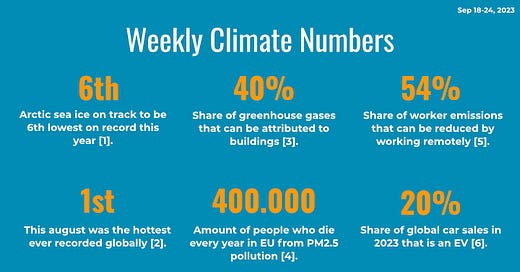[Sep 18-24'23] The Climate Unambitious Summit
Warmer oceans means more bacterial infections, space-based solar FTW, why we need to sweat and how Exxons has deceived since 1970s.
Welcome to this week’s edition of The Weekly Climate 🎉
References: [1], [2], [3], [4], [5] and [6].
Aaand we’re back. And we’re back with an announcement! As some of you may know I’ve been working on a climate tech startup for some time now and we just came out of stealth! Therefore I’m happy to just spend a few words presenting Elby to you today.
EV charging in big cities is totally broken. Not only are charging stations in most cities few and far between (especially when you think about that many countries are starting to ban ICE cars from 2030) but they’re also an eyesore and insanely expensive to setup because to put up a charging station you need to apply for permits, dig, connect to the grid etc. All in all it’s a month long process to put up a charging station today.
At Elby we take a completely different approach. With Elby we turn apartment buildings into charging stations. Instead of having to expand the grid and dig etc, our unique and patent pending solution connects to the buildings existing grid and utilise any excess power (at night for instance) to charge cars. It can be installed for a fraction of the cost and time of an existing charging station AND you as the apartment / building owner even make money while people charge their cars. In fact our install costs are so cheap that we give chargers away for free. For the first time we give city dwellers the same opportunity as people who live in a house: To charge where you park, not park where you charge.
You can read more about us on elby.co/english. Currently taking pre-orders. Any comments / feedback / questions etc are always welcome.
Ok that’s it about Elby. Thanks for sticking with me. Now we return to the regular scheduled newsletter.
‼️News you can’t miss
Here’s one important scary/bad (🙀), good (😻), interesting (😼) and fossil (💩) news item.
🙀 Warming oceans increases the risk of bacterial infections
😻 Space-based solar is gaining attention as potential alternative clean energy source
💩 How Exxon undermined climate science since the 1970s
👩⚕️ Status: Climate & Science
Let’s look at how we’re doing this week!
[#arctic] — The German research ship Polarstern has returned to the North Pole to study the changing Central Arctic as part of the ArcWatch expedition. Sea-ice coverage in the Arctic is on track to be the sixth lowest on record this year. Since satellite observations began in 1979, Arctic sea ice has declined by about 13 percent per decade. The expedition aims to provide year-round data on weather and sea conditions in the Central Arctic and map the ocean floor in remote areas.
[#wildfireemissions] — This article discusses the challenges scientists face in estimating and modeling CO2 emissions from wildfires. It explores the role of fire in different ecosystems, the difficulties in measuring and modeling emissions, the connection between wildfires and net-zero targets, and future fire management strategies. The document emphasizes the need for accurate measurements, improved data collection, and the consideration of human impacts and indigenous knowledge in managing wildfires.
[#augustheat] — August 2023 was the hottest August on record, with the global land and ocean surface temperature ~1.3 degrees C above the 20th-century average. It also marked the Northern Hemisphere's warmest meteorological summer and the Southern Hemisphere's warmest meteorological winter. The increasing temperatures are attributed to global marine heat waves, a growing El Niño, and ongoing emissions. The report also highlights other notable climate events, such as record-low sea ice extent and increased tropical storm activity.
📰 The 7 Grand Challenges
⚡️Decarbonize Electricity
Clean electricity is the one do-or-die challenge we must solve.
[#spacesolar] — Space-based solar power, a clean energy technology that has long been overshadowed, is gaining attention as a possible alternative energy source. Recent advancements in wireless power transfer in space have shown promise, with the potential to transmit massive amounts of energy from solar panels in space to receivers on Earth. The declining cost of rocket launches and the use of microwaves for power beaming are making space-based solar power more feasible. However, there are still engineering, safety, regulatory, and funding challenges to overcome before it can become a reality.
🏘 Reduce impact of urban and rural areas
Lowering the impact of urban and rural areas.
Keep reading with a 7-day free trial
Subscribe to The Weekly Climate to keep reading this post and get 7 days of free access to the full post archives.




